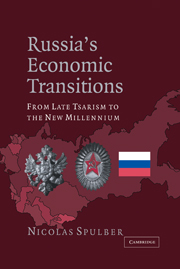Book contents
- Frontmatter
- Contents
- Figures and Tables
- Preface
- PART I THE TSARIST ECONOMIC TRANSITION
- 1 The Socioeconomic Framework
- 2 The Transition Issues
- 3 The Economic Policies
- 4 The Problems of Agriculture
- 5 The Industrial Changes
- 6 Domestic and Foreign Trade
- 7 Money and Banking
- 8 State Finance
- 9 Overall View
- PART II THE SOVIET ECONOMIC TRANSITION
- PART III THE POST-SOVIET ECONOMIC TRANSITION
- Index
9 - Overall View
Published online by Cambridge University Press: 03 December 2009
- Frontmatter
- Contents
- Figures and Tables
- Preface
- PART I THE TSARIST ECONOMIC TRANSITION
- 1 The Socioeconomic Framework
- 2 The Transition Issues
- 3 The Economic Policies
- 4 The Problems of Agriculture
- 5 The Industrial Changes
- 6 Domestic and Foreign Trade
- 7 Money and Banking
- 8 State Finance
- 9 Overall View
- PART II THE SOVIET ECONOMIC TRANSITION
- PART III THE POST-SOVIET ECONOMIC TRANSITION
- Index
Summary
Transition and the Agricultural Economy
Looking over the entire period after 1861 until the revolution of 1917, what conclusions can be drawn from the data presented throughout Part I about the extent of capitalist relations in the Russian economy in general and in the main branches of its primary, secondary, and tertiary sectors? In which specific ways were Russia's capitalist developments similar or different from those which took place simultaneously in the advanced West European economies? To what extent can the term “dual economy,” which I used throughout this study, be considered as valid? Finally, which factors contributed to the collapse of Tsarism and to the emergence from the dual economy of a new economic order?
This concluding chapter on the Tsarist economy outlines the key aspects of the changes that occurred there from 1861 onward, presents some data on Russia's income and wealth, and methodically compares Russia's achievements with those in the West. I refer throughout this discussion continually to Lenin's work The Development of Capitalism in Russia in order to clearly indicate the ways in which these conclusions differ from those set forth by the founder of the Soviet regime.
Lenin's basic contentions concerning Russia's agrarian economy, which played a crucial role in the Bolsheviks' strategy and tactics against Tsarism, were from the end of the nineteenth century on the following: Russia's agriculture had become an “industry,” that is, “a producer of commodities”; the peasantry lived henceforth in a “commodity economy” and was accordingly “completely subordinated to the market”; the surge of “property inequality” in the countryside dissolved socially the old peasantry and replaced it with “a rural bourgeoisie” and a “rural proletariat,” that is, a class of commodity producers, and a class of wage workers.
- Type
- Chapter
- Information
- Russia's Economic TransitionsFrom Late Tsarism to the New Millennium, pp. 138 - 152Publisher: Cambridge University PressPrint publication year: 2003



